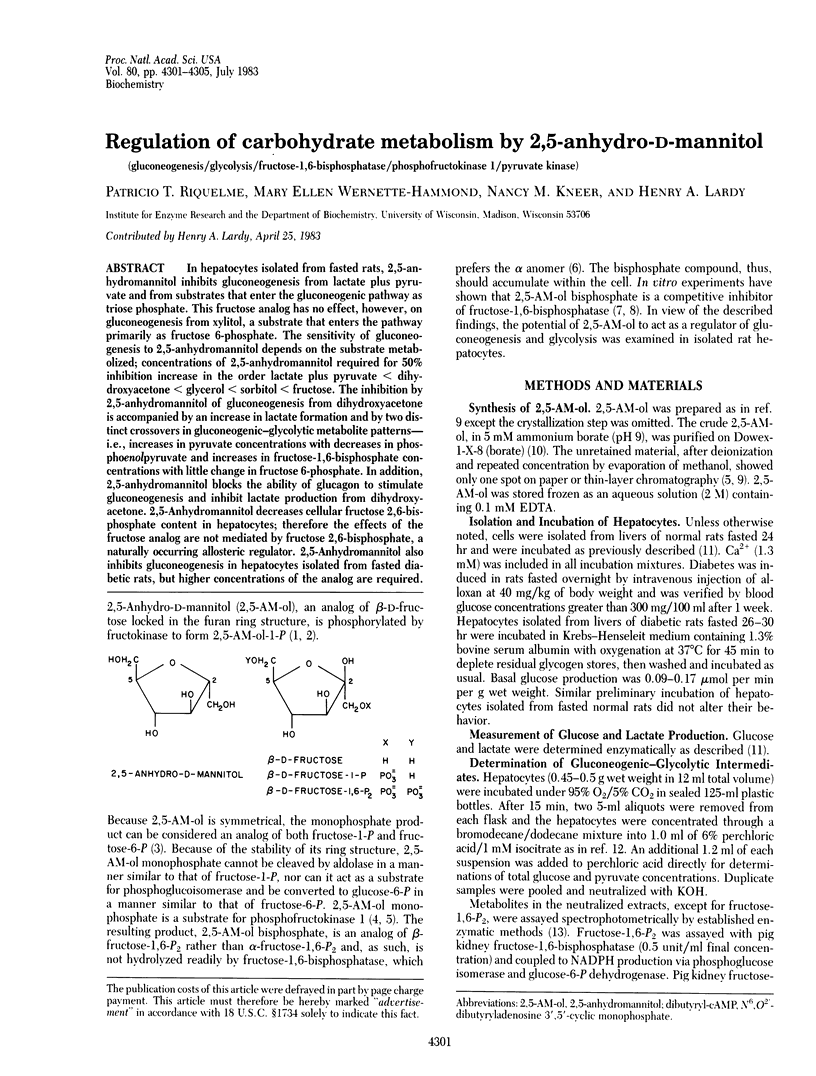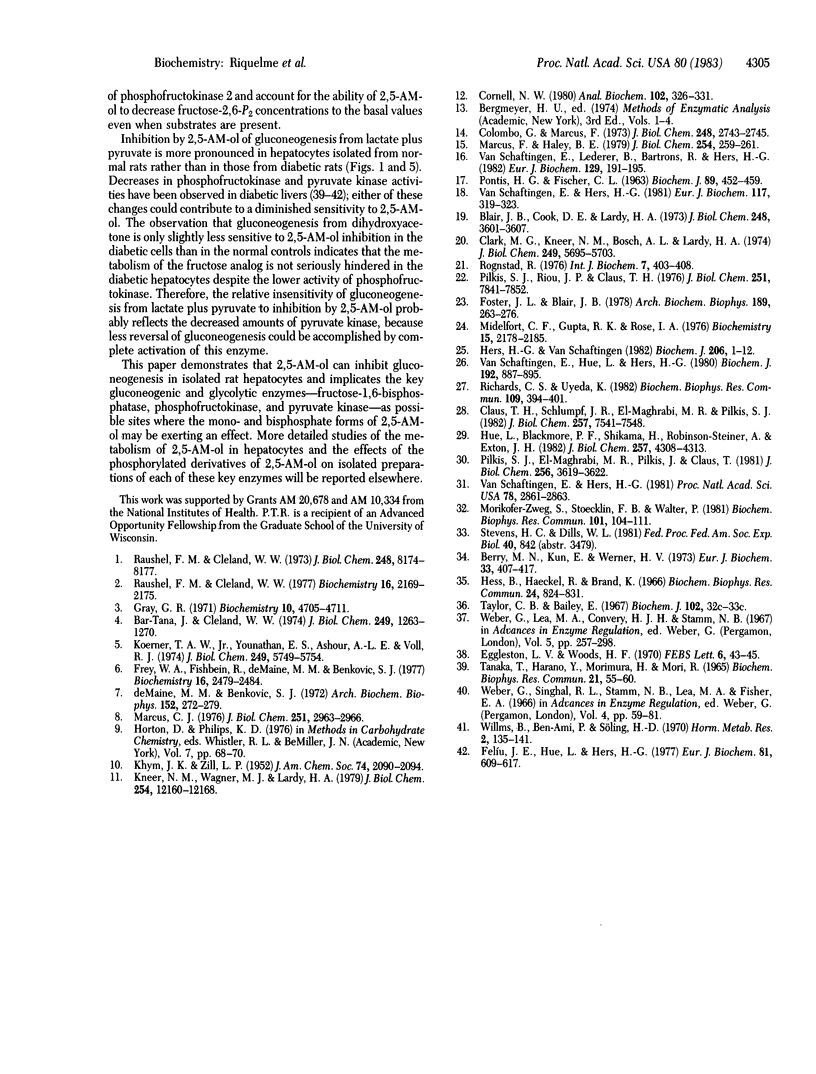Abstract
In hepatocytes isolated from fasted rats, 2,5-anhydromannitol inhibits gluconeogenesis from lactate plus pyruvate and from substrates that enter the gluconeogenic pathway as triose phosphate. This fructose analog has no effect, however, on gluconeogenesis from xylitol, a substrate that enters the pathway primarily as fructose 6-phosphate. The sensitivity of gluconeogenesis to 2,5-anhydromannitol depends on the substrate metabolized; concentrations of 2,5-anhydromannitol required for 50% inhibition increase in the order lactate plus pyruvate less than dihydroxyacetone less than glycerol less than sorbitol less than fructose. The inhibition by 2,5-anhydromannitol of gluconeogenesis from dihydroxyacetone is accompanied by an increase in lactate formation and by two distinct crossovers in gluconeogenic-glycolytic metabolite patterns-i.e., increases in pyruvate concentrations with decreases in phosphoenolpyruvate and increases in fructose-1,6-bisphosphate concentrations with little change in fructose 6-phosphate. In addition, 2,5-anhydromannitol blocks the ability of glucagon to stimulate gluconeogenesis and inhibit lactate production from dihydroxyacetone. 2,5-Anhydromannitol decreases cellular fructose 2,6-bisphosphate content in hepatocytes; therefore the effects of the fructose analog are not mediated by fructose 2,6-bisphosphate, a naturally occurring allosteric regulator. 2,5-Anhydromannitol also inhibits gluconeogenesis in hepatocytes isolated from fasted diabetic rats, but higher concentrations of the analog are required.
Full text
PDF




Selected References
These references are in PubMed. This may not be the complete list of references from this article.
- Bar-Tana J., Cleland W. W. Rabbit muscle phosphofructokinase. I. Anomeric specificity; initial velocity kinetics. J Biol Chem. 1974 Feb 25;249(4):1263–1270. [PubMed] [Google Scholar]
- Berry M. N., Kun E., Werner H. V. Regulatory role of reducing-equivalent transfer from substrate to oxygen in the hepatic metabolism of glycerol and sorbitol. Eur J Biochem. 1973 Mar 15;33(3):407–417. doi: 10.1111/j.1432-1033.1973.tb02697.x. [DOI] [PubMed] [Google Scholar]
- Blair J. B., Cook D. E., Lardy H. A. Influence of glucagon on the metabolism of xylitol and dihydroxyacetone in the isolated perfused rat liver. J Biol Chem. 1973 May 25;248(10):3601–3607. [PubMed] [Google Scholar]
- Clark M. G., Kneer N. M., Bosch A. L., Lardy H. A. The fructose 1,6-diphosphatase-phosphofructokinase substrate cycle. A site of regulation of hepatic gluconeogenesis by glucagon. J Biol Chem. 1974 Sep 25;249(18):5695–5703. [PubMed] [Google Scholar]
- Claus T. H., Schlumpf J. R., El-Maghrabi M. R., Pilkis S. J. Regulation of the phosphorylation and activity of 6-phosphofructo 1-kinase in isolated hepatocytes by alpha-glycerolphosphate and fructose 2,6-bisphosphate. J Biol Chem. 1982 Jul 10;257(13):7541–7548. [PubMed] [Google Scholar]
- Cornell N. W. Rapid fractionation of cell suspensions with the use of brominated hydrocarbons. Anal Biochem. 1980 Mar 1;102(2):326–331. doi: 10.1016/0003-2697(80)90162-1. [DOI] [PubMed] [Google Scholar]
- De Maine M. M., Benkovic S. J. On the mechanism of alkaline and neutral fructose 1, 6-diphosphatase: inhibition by substrate analogs at neutral pH. Arch Biochem Biophys. 1972 Sep;152(1):272–279. doi: 10.1016/0003-9861(72)90215-9. [DOI] [PubMed] [Google Scholar]
- Eggleston L. V., Woods H. F. Activation of liver pyruvate kinase by fructose-1-phosphate. FEBS Lett. 1970 Jan 15;6(1):43–45. doi: 10.1016/0014-5793(70)80038-2. [DOI] [PubMed] [Google Scholar]
- Felíu J. E., Hue L., Hers H. G. Regulation in vitro and in vivo of adenosine 3':5'-monophosphate-dependent inactivation of rat-liver pyruvate kinase type L. Eur J Biochem. 1977 Dec;81(3):609–617. doi: 10.1111/j.1432-1033.1977.tb11988.x. [DOI] [PubMed] [Google Scholar]
- Foster J. L., Blair J. B. Acute hormonal control of pyruvate kinase and lactate formation in the isolated rat hepatocyte. Arch Biochem Biophys. 1978 Aug;189(2):263–276. doi: 10.1016/0003-9861(78)90212-6. [DOI] [PubMed] [Google Scholar]
- Frey W. A., Fishbein R., de Maine M. M., Benkovic S. J. Substrate form of D-frutose 1,6-bisphosphate utilized by fructose 1,6-bisphosphatase. Biochemistry. 1977 May 31;16(11):2479–2484. doi: 10.1021/bi00630a025. [DOI] [PubMed] [Google Scholar]
- Gray G. R. An examination of D-fructose 1,6-diphosphate and related sugar phosphates by fourier transform 31 P nuclear magnetic resonance spectroscopy. Biochemistry. 1971 Dec 7;10(25):4705–4711. doi: 10.1021/bi00801a017. [DOI] [PubMed] [Google Scholar]
- Hers H. G., Van Schaftingen E. Fructose 2,6-bisphosphate 2 years after its discovery. Biochem J. 1982 Jul 15;206(1):1–12. doi: 10.1042/bj2060001. [DOI] [PMC free article] [PubMed] [Google Scholar]
- Hess B., Haeckel R., Brand K. FDP-activation of yeast pyruvate kinase. Biochem Biophys Res Commun. 1966 Sep 22;24(6):824–831. doi: 10.1016/0006-291x(66)90322-6. [DOI] [PubMed] [Google Scholar]
- Hue L., Blackmore P. F., Shikama H., Robinson-Steiner A., Exton J. H. Regulation of fructose-2,6-bisphosphate content in rat hepatocytes, perfused hearts, and perfused hindlimbs. J Biol Chem. 1982 Apr 25;257(8):4308–4313. [PubMed] [Google Scholar]
- Kneer N. M., Wagner M. J., Lardy H. A. Regulation by calcium of hormonal effects on gluconeogenesis. J Biol Chem. 1979 Dec 10;254(23):12160–12168. [PubMed] [Google Scholar]
- Koerner T. A., Jr, Younathan E. S., Ashour A. L., Voll R. J. The fructose 6-phosphate site of phosphofructokinase. I. Tautomeric and anomeric specificity. J Biol Chem. 1974 Sep 25;249(18):5749–5754. [PubMed] [Google Scholar]
- Marcus C. J. Inhibition of bovine hepatic fructose-1,6-diphosphatase by substrate analogs. J Biol Chem. 1976 May 25;251(10):2963–2966. [PubMed] [Google Scholar]
- Marcus F., Haley B. E. Inhibition of fructose-1,6-biphosphatase by the photoaffinity AMP analog, 8-azidoadenosine 5'-monophosphate. J Biol Chem. 1979 Jan 25;254(2):259–261. [PubMed] [Google Scholar]
- Midelfort C. F., Gupta R. K., Rose I. A. Fructose 1,6-bisphosphate: isomeric composition, kinetics, and substrate specificity for the aldolases. Biochemistry. 1976 May 18;15(10):2178–2185. doi: 10.1021/bi00655a023. [DOI] [PubMed] [Google Scholar]
- Mörikofer-Zwez S., Stoecklin F. B., Walter P. Fructose 1,6-bisphosphatase in rat liver cytosol: activation after glucagon treatment in vivo and inhibition by fructose 2,6-bisphosphate in vitro. Biochem Biophys Res Commun. 1981 Jul 16;101(1):104–111. doi: 10.1016/s0006-291x(81)80016-2. [DOI] [PubMed] [Google Scholar]
- PONTIS H. G., FISCHER C. L. SYNTHESIS OF D-FRUCTOPYRANOSE 2-PHOSPHATE AND D-FRUCTOFURANOSE 2-PHOSPHATE. Biochem J. 1963 Dec;89:452–459. doi: 10.1042/bj0890452. [DOI] [PMC free article] [PubMed] [Google Scholar]
- Pilkis S. J., El-Maghrabi M. R., Pilkis J., Claus T. Inhibition of fructose-1,6-bisphosphatase by fructose 2,6-bisphosphate. J Biol Chem. 1981 Apr 25;256(8):3619–3622. [PubMed] [Google Scholar]
- Pilkis S. J., Riou J. P., Claus T. H. Hormonal control of [14C]glucose synthesis from [U-14C]dihydroxyacetone and glycerol in isolated rat hepatocytes. J Biol Chem. 1976 Dec 25;251(24):7841–7852. [PubMed] [Google Scholar]
- Raushel F. M., Cleland W. W. Bovine liver fructokinase: purification and kinetic properties. Biochemistry. 1977 May 17;16(10):2169–2175. doi: 10.1021/bi00629a020. [DOI] [PubMed] [Google Scholar]
- Raushel F. M., Cleland W. W. The substrate and anomeric specificity of fructokinase. J Biol Chem. 1973 Dec 10;248(23):8174–8177. [PubMed] [Google Scholar]
- Richards C. S., Uyeda K. The effect of insulin and glucose on fructose-2,6-P2 in hepatocytes. Biochem Biophys Res Commun. 1982 Nov 30;109(2):394–401. doi: 10.1016/0006-291x(82)91734-x. [DOI] [PubMed] [Google Scholar]
- Tanaka T., Harano Y., Morimura H., Mori R. Evidence for the presence of two types of pyruvate kinase in rat liver. Biochem Biophys Res Commun. 1965 Oct 8;21(1):55–60. doi: 10.1016/0006-291x(65)90425-0. [DOI] [PubMed] [Google Scholar]
- Taylor C. B., Bailey E. Activation of liver pyruvate kinase by fructose 1,6-diphosphate. Biochem J. 1967 Feb;102(2):32C–33C. doi: 10.1042/bj1020032c. [DOI] [PMC free article] [PubMed] [Google Scholar]
- Van Schaftingen E., Hers H. G. Formation of fructose 2,6-bisphosphate from fructose 1,6-bisphosphate by intramolecular cyclisation followed by alkaline hydrolysis. Eur J Biochem. 1981 Jul;117(2):319–323. doi: 10.1111/j.1432-1033.1981.tb06339.x. [DOI] [PubMed] [Google Scholar]
- Van Schaftingen E., Hers H. G. Inhibition of fructose-1,6-bisphosphatase by fructose 2,6-biphosphate. Proc Natl Acad Sci U S A. 1981 May;78(5):2861–2863. doi: 10.1073/pnas.78.5.2861. [DOI] [PMC free article] [PubMed] [Google Scholar]
- Van Schaftingen E., Hue L., Hers H. G. Control of the fructose-6-phosphate/fructose 1,6-bisphosphate cycle in isolated hepatocytes by glucose and glucagon. Role of a low-molecular-weight stimulator of phosphofructokinase. Biochem J. 1980 Dec 15;192(3):887–895. doi: 10.1042/bj1920887. [DOI] [PMC free article] [PubMed] [Google Scholar]
- Van Schaftingen E., Lederer B., Bartrons R., Hers H. G. A kinetic study of pyrophosphate: fructose-6-phosphate phosphotransferase from potato tubers. Application to a microassay of fructose 2,6-bisphosphate. Eur J Biochem. 1982 Dec;129(1):191–195. doi: 10.1111/j.1432-1033.1982.tb07039.x. [DOI] [PubMed] [Google Scholar]
- Weber G., Lea M. A., Convery H. J., Stamm N. B. Regulation of gluconeogenesis and glycolysis: studies of mechanisms controlling enzyme activity. Adv Enzyme Regul. 1967;5:257–300. doi: 10.1016/0065-2571(67)90020-9. [DOI] [PubMed] [Google Scholar]
- Weber G., Singhal R. L., Stamm N. B., Lea M. A., Fisher E. A. Synchronous behavior pattern of key glycolytic enzymes: glucokinase, phosphofructokinase, and pyruvate kinase. Adv Enzyme Regul. 1966;4:59–81. doi: 10.1016/0065-2571(66)90007-0. [DOI] [PubMed] [Google Scholar]


